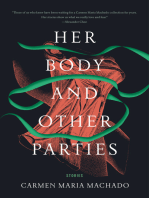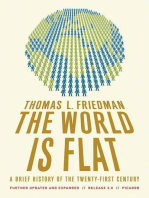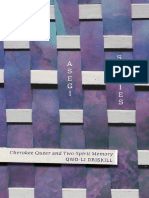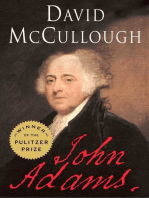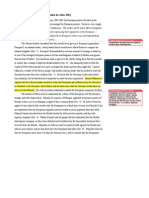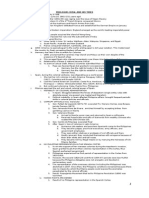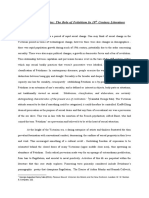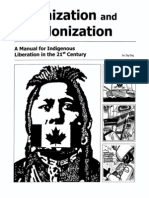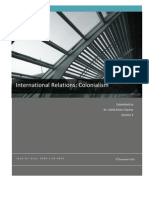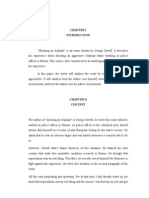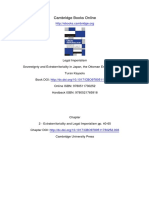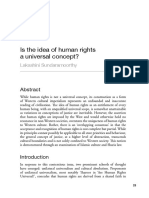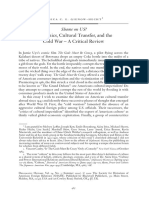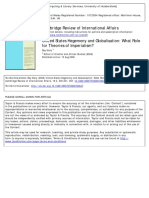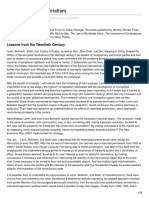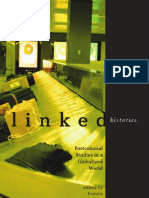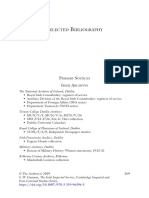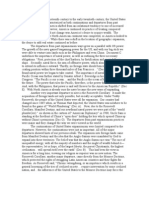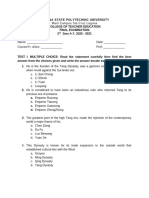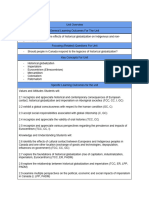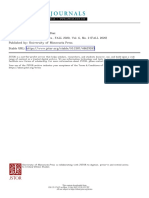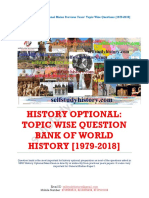The Dual Legacy of Orientalism
The Dual Legacy of Orientalism
Uploaded by
gabyCopyright:
Available Formats
The Dual Legacy of Orientalism
The Dual Legacy of Orientalism
Uploaded by
gabyOriginal Title
Copyright
Available Formats
Share this document
Did you find this document useful?
Is this content inappropriate?
Copyright:
Available Formats
The Dual Legacy of Orientalism
The Dual Legacy of Orientalism
Uploaded by
gabyCopyright:
Available Formats
The Dual Legacy of Orientalism
Vivek Chibber
There is little doubt that Edward Said’s Orientalism is one of the most
influential scholarly works of the past few decades. While it was initially
presented by its author as a study of how a particular body of knowledge
contributed to the spread of European colonial rule, its influence has
extended to just about every domain connected with imperialism, colonial
history, race, and political identity. Owing to the very scope of the work
that either builds directly on Said’s argument or is inspired by it, it is not a
simple task to assess his legacy. Perhaps the most contentious issue is its
impact on the study of the Global South and, more specifically, on the
field that developed rapidly after Orientalism’s publication, postcolonial
studies. In many ways, it is hard to imagine that there could be a direct
connection between Said’s profound commitment to humanism, univer-
sal rights, secularism, and liberalism, on the one hand, and postcolonial
theory’s quite explicit disavowal of, or at least its skepticism toward, those
very tropes on the other hand. And indeed, his most able interpreters have
made a powerful case that the connection is, at best, tenuous. In this essay
I will suggest that whatever his own commitments, Orientalism prefigured,
and hence encouraged, some of the central dogmas of postcolonial studies –
indeed, the very ones that cannot withstand scrutiny. And despite its very
many strengths, its legacy is therefore a dual one – propelling the critique
of imperialism into the very heart of the mainstream, on the one hand, but
also giving strength to intellectual fashions that have undermined the
possibility of that very critique on the other hand.
Orientalism as Cause and Effect
There are two arguments in Orientalism about the relation between
Western imperialism and its accompanying discourse. The first, and the
one that has emerged as a kind of folk conception of the phenomenon,
describes Orientalism as a rationalization for colonial rule. Said dates this
https://doi.org/10.1017/9781108554251.003 Published online by Cambridge University Press
Orientalism to the eighteenth century, with the rise of what is now called
the Second British Empire, and Orientalism continued into the Cold War
when the United States displaced Britain as the global hegemon. It was
during these centuries that Orientalism flourished as a body of knowledge
that not only described and systematized how the East was understood but
also did so in a fashion that justified its domination by the West. Hence,
if nationalists demanded the right to self-governance by Asians, or criti-
cized the racism of colonial regimes, defenders schooled in Orientalism
could retort:
That Orientals have never understood the meaning of self-government the
way “we” do. When Orientals oppose racial discrimination while others
practice it, you say “they’re all Orientals at bottom”, and class interest,
political circumstances and economic factors are totally irrelevant . . . His-
tory, politics, and economics do not matter. Islam is Islam, the Orient is the
Orient, and please take all your ideas about a left and a right wing,
revolutions, and change back to Disneyland.
In other words, the normal grounds of political judgment did not apply to
colonial settings, because, in relying on them, colonial critics presumed
that Eastern peoples were motivated by the same needs and goals as those
of the West. But this, Orientalism advised, was a fallacy. Asians did not
think in terms of self-determination, class, their economic interests, and so
forth. To object to colonialism claiming it rode roughshod over these
needs, or, more ambitiously, to generate a system of rights based on the
presumptive universality of those needs, was to ignore the distinctiveness of
Eastern culture. It was based on a category mistake and, indeed, could even
be criticized as an insensitivity to their cultural specificity. In so concep-
tualizing the colonial subject as the quintessential Other, Orientalism
absolved imperialism of any wrongdoing and thereby stripped demands
for self-determination of any moral authority. Said’s argument here is a
fairly traditional, materialist explanation for how and why Orientalist
ideology came to occupy such a prominent place in European culture in
the modern period. Just as any system of domination creates an ideological
discourse to justify and naturalize its superordinate position, so too colo-
nialism created a legitimizing discourse of its own. The key here is that the
causal arrow runs from imperial domination to the discourse it created –
simply put, colonialism created Orientalism.
This is undoubtedly the argument for which Orientalism is best known.
But it is also the component of Said’s argument that is the most conven-
tional and familiar. Said was not by any means the first anti-imperialist to
describe modern Orientalism as being tied to the colonial project. Or, to
https://doi.org/10.1017/9781108554251.003 Published online by Cambridge University Press
The Dual Legacy of Orientalism
put it more broadly, he was not the first to show that much of the social
scientific and cultural scholarship produced by colonial powers was in fact
geared to justifying their rule over Eastern nations. As Said noted, albeit
somewhat belatedly, his book was preceded by scores of works that made
the same argument from scholars belonging to the postcolonial world.
Many, if not most, belonged to the Marxist tradition in some degree of
proximity. What set Said’s great book apart, then, was not the argument
he made but the erudition and literary quality that he brought to it. For
even while others had made claims that were identical to his, no one had
made them with the same panache and, hence, to the same effect.
But Said also makes another argument, running through the entirety of
his book, that reverses this causal arrow, and takes the argument in an
entirely novel direction. On this version, Orientalism was not a conse-
quence of colonialism, but one of its causes: “To say simply that Oriental-
ism was a rationalization of colonial rule,” Said avers, “is to ignore the
extent to which colonial rule was justified in advance by Orientalism,
rather than after the fact.” In other words, Orientalism was around far
before the modern era and, by virtue of its depiction of the East, it created
the cultural conditions for the West to embark on its colonial project.
That depiction had at its core the urge to categorize, schematize, and
exoticize the East, viewing it as mysterious and unchanging, in contrast to
the familiar and dynamic West. Hence, the West was ordained the center
of moral and scientific progress, and the exotic and unchanging East,
which was an object to be studied and apprehended, but always alien,
was always distant.
Said traces this tendency back to the Classical world, continuing
through the medieval period, and culminating in the great works of the
Renaissance and after. This implies that Orientalism is not so much a
product of circumstances specific to a historical conjuncture, but some-
thing embedded deeply in Western culture. To push this argument, Said
makes a distinction between latent and manifest Orientalism. The latent
components are its essential core, its basic moral and conceptual architec-
ture, which have been in place since Homer and define it as a discourse. Its
manifest elements are what give Orientalism its form in any particular
era and, hence, the components that undergo change in the course of
history. Manifest Orientalism organizes the basic, underlying bits compris-
ing latent Orientalism into a coherent doctrine, and its most coherent
incarnation is, of course, the one synthesized in the modern era.
This distinction enables Said to accommodate the obvious fact that, as a
discourse, Orientalism has not remained unchanged across space and time.
https://doi.org/10.1017/9781108554251.003 Published online by Cambridge University Press
He readily admits that Western conceptions of the East have undergone
innumerable transformations in form and content over the centuries. Still,
“[W]hatever change occurs in knowledge of the Orient is found almost
exclusively in manifest Orientalism.” In other words, the changes have only
been in the way Orientalism’s essential principles are expressed, their
essence remaining more or less the same across the centuries. Said con-
tinues, “[T]he unanimity, stability, and durability of latent Orientalism are
more or less constant [over time].”
It is not just that latent Orientalism imbricates itself into the pores of
Western culture. It is also that, once embedded so securely, it goes beyond
simple bias to becoming a practical orientation – an urge to bring reality in
line with its conception of how the world ought to be. To Said, this
practical stance has been a defining characteristic of the Orientalist mind-
set, from Antiquity to the modern era, despite all the changes that it
experienced across time. This has enormous consequences for the fate of
East-West relations. Said poses the following question: Once the world is
carved up analytically the way Orientalism enjoins us to, “can one survive
the consequences humanly? [Is there] any way of avoiding the hostility by
the division, say, of men into ‘us’ (Westerners) and ‘they’ (Orientals).”
The question is rhetorical, of course, because for Said the answer is
obviously in the negative. The hostility bred by latent Orientalism is
passed on from one generation to another as a pillar of Western culture,
always viewing the East as inferior. And as it becomes internalized and
fixed as a cultural orientation, the urge to improve the natives, to help them
clamber up the civilizational hierarchy, becomes irresistible. It slowly
generates a momentum toward a transition from gaining knowledge about
the Orient to the more ambitious project of acquiring power over it. Said’s
own description of this process is worth quoting:
Transmitted from one generation to another, it [latent Orientalism] was a
part of the culture, as much a language about a part of reality as geometry or
physics. Orientalism staked its existence, not upon its openness, its receptiv-
ity to the Orient, but rather on its internal, repetitious consistency about its
constitutive will-to-power over the Orient.
Latent Orientalism came packaged as a will-to-power: This was the prac-
tical orientation that it embodied. Hence, the obsessive accumulation of
facts, Said suggests, “made Orientalism fatally tend toward the systematic
accumulation of human beings and territories.”
Notice that this version of his argument just about completely inverts
the first, materialist, one: instead of a system of domination creating its
https://doi.org/10.1017/9781108554251.003 Published online by Cambridge University Press
The Dual Legacy of Orientalism
justifying ideology, it is the latter that generates the former: An ideology
now creates the power relations that it justifies. One is not sure how far
Said wishes to press this point – whether he takes Orientalism to merely be
an enabling condition for colonialism’s rise, as against a stronger, more
propulsive role. I will consider the merits of both interpretations later in
this essay. But it seems clear that, on this second argument, he views
Orientalism as in some way responsible for the rise of European colonial-
ism, not just its consequence.
Now this argument, unlike the first, does add considerable novelty to
the critique of Orientalism. As Fred Halliday observed in a discussion of
the book, critiques of Orientalist constructions had typically been materi-
alist in their approach and grounded in political economy. Said’s original-
ity derived in his formulation of an argument that gave a nod to this older
approach, but then veered decisively away from it, offering what was an
unmistakably culturalist alternative. Hence, “[W]hile much of the other
work was framed in broadly Marxist terms and was a universalist critique,
Said, eschewing materialist analysis, sought to apply literary critical meth-
odology and to offer an analysis specific to something called ‘the
Orient.’” It is to this innovation that we now turn.
Two Early Critics
Said’s second argument attracted some attention in the early years after
Orientalism appeared, most pointedly in Sadik al-Azm’s biting critique in
Khamsin, and then in Aijaz Ahmad’s broadside in his book In Theory. As
al-Azm correctly observed, Said’s second argument was not only in tension
with but also fatally undermined his objective of criticizing Orientalist
views of modern history. For to say, as Said did, that Orientalism had been
the defining element in the Western constructions of the East, without
attributing it to any social or institutional matrix, strongly suggested that
Orientalism was in some way part of the enduring cognitive apparatus of
the West. It led inexorably to the conclusion, al-Azm suggested, that
“Orientalism is not really a thoroughly modern phenomenon . . . but is
the natural product of an ancient and almost irresistible European bent of
mind to misrepresent the realities of other cultures, peoples, and their
languages, in favour of Occidental self-affirmation.” But if this is what
Said was saying, then did it not resurrect the very Orientalism that he
disavowed? A defining characteristic of this worldview, after all, was the
idea of an ontological chasm separating East and West, which the fields,
categories, and theories emanating from the West could not traverse. The
https://doi.org/10.1017/9781108554251.003 Published online by Cambridge University Press
Western mind, in other words, was not capable of apprehending the true
nature of Eastern culture. Said’s implantation of Orientalist discourse as an
unchanging component of Western culture seemed to reinforce this very
idea – of the inscrutability of the Orient to Western eyes – from the
Greeks to Henry Kissinger.
The same questions about Said’s second argument were raised by Aijaz
Ahmad in a landmark assessment of his broader oeuvre, published almost a
decade after al-Azm’s review. Ahmad speculated that Said’s second
rendering of the connection between Orientalism and colonialism was
perhaps attributable to the influence of Foucault; though, for Ahmad, it
was questionable whether Foucault would have supported the idea of a
putative continuity in Western discourse from Homer to Nixon. The
critical problem for Ahmad, however, was not Said’s fidelity to Foucault,
but the theoretical and political consequences of locating Orientalism in
the deep recesses of Western culture, rather than among the consequences
of colonialism. Ahmad raised two issues in particular.
First, Said seemed to take the Orientalist mind-set to be so pervasive in
scope and so powerful in influence that the possibility of escaping its grip
appeared exceedingly remote. Hence, even thinkers known to be fierce
critics of British colonialism are blandly assimilated into the rogues’ gallery
of European Orientalists. The most prominent figure in this regard is
Marx, who Said relegates to this ignominious status with only the flimsiest
of explanations. Ahmad’s foregrounding of this issue was surely justified,
given the role that Marx and his followers had played in not only criticizing
the racism of colonial apologists but also in their leading role in antic-
olonial movements – from Ireland, to India, from Tanzania to Said’s own
homeland of Palestine. Ahmad pointed out, again correctly, that the very
passages that Said singled out as instances of cultural parochialism could
easily be read in a very different vein as describing, not the superiority of
Western culture, but the brutality of colonial rule. In any case, regardless
of one’s judgment about Marx, what was at issue here was whether Said
could justifiably claim that Orientalism not only stretched back to Clas-
sical Greece but also exercised such power as to absorb even its critics.
Further, Ahmad pointed to a second, equally important implication of
the analysis. Said’s argument, and also his vocabulary, pushed strongly
toward displacing the traditional interest-based explanations for colonial-
ism in the direction of one relying on civilizational clashes. Conventional
accounts of colonial expansion had typically adverted to the role of interest
groups, classes, and state managers as its animating force. For Marxists it
had been capitalists, for nationalists it had been “British interests,” and for
https://doi.org/10.1017/9781108554251.003 Published online by Cambridge University Press
The Dual Legacy of Orientalism
liberals it was overly ambitious political leaders. What all these explan-
ations had in common was the central role that they accorded to material
interests as the motivating factor in colonial rule. But if in fact Orientalism
as a body of thought propels its believers toward the accumulation of
territories, then it is not interests that drive the project, but a deeply rooted
cultural disposition – a discourse, to put it in contemporary jargon. As
Ahmad concludes:
This idea of constituting identity through difference points, again, not to the
realm of political economy in which colonisation may be seen as a process
of capitalist accumulation but to a necessity which arises within discourse
and has always been there at the origin of discourse, so that not only is the
modern orientalist presumably already there in Dante and Euripedes but
modern imperialism itself appears to be an effect that arises, as if naturally,
from the necessary practices of discourse. (; emphasis added)
Ahmad is registering his agreement with al-Azm’s judgment that Said has
reversed the causal arrow that normally went from colonialism to Oriental-
ism. Naturally this means that the study of this phenomenon moves from
the ambit of political economy to cultural history. But it is not just that
colonial expansion appears to be an artifact of discourse. The dispositions
that it comprises are placed by him, not in a particular region or historical
era, but in an undifferentiated entity called “the West,” stretching back
two millennia. This is, of course, a classically Orientalist assertion on Said’s
part. But its implications for the study of colonialism are profound. For
colonialism now appears, not as the consequence of developments particu-
lar to a certain era, but as an expression of a deeper ontological divide
between East and West, a symptom of the cultural orientation of Europe’s
inhabitants. We have gone from the culprit being British capitalists, to its
being “the West” – from classes to cultures.
Said never addressed either al-Azm or Ahmad’s criticisms – a shame
because they remain among the most important and devastating engage-
ments with his work to date. In a private exchange with al-Azm, he
promised to reply at some length, and indeed to dismantle al-Azm’s entire
critique point by point. But he never delivered on that promise, nor did
he respond in print to Ahmad’s critique. In the rest of this essay I purpose
to build upon those early interventions to push further in the same
direction. Ahmad and al-Azm were justified in their observation that Said’s
argument had turned the corner from materialist critique of ideology to an
idealist argument. But while their accusation was correct, their justification
of it was not fully developed – perhaps because they took the weakness of
idealist Said’s argument for granted. In today’s context, however, it is
https://doi.org/10.1017/9781108554251.003 Published online by Cambridge University Press
important to further develop the line of argument they opened up, and
demonstrate why Said’s view is wrong by virtue of its idealism.
The crux of what I wish to argue is that Said’s second argument – that
colonialism was a consequence of Orientalism, not its cause – was not only
disturbing in its implications but also that it could not possibly be right,
on Said’s own admission. In other words, what al-Azm and Ahmad failed
to observe was that the second argument was contradicted by Said’s own
evidence. Orientalism could not have generated modern colonialism or even
contributed to it in any significant way. Its roots therefore have to be
sought in political economy, not in European culture – much as material-
ists had argued for decades.
Culture and Colonialism
Said is correct in his observation that ethnocentric and essentializing
depictions of the East were widespread among European observers from
the earliest times. The question is what explanatory role such depictions
are accorded in the rise of European colonialism. We have seen in the
preceding section that Said clearly assigns considerable importance to them
in this regard. Just what the causal chain is that connects them to it, and
how important they are compared to other factors, is murky. But we can
be confident that the role is important because he never qualifies it, nor
feels compelled to embed it in a wider discussion of how it combined with
other forces that pushed Britain and France outward in the modern era.
The problem with Said’s view is that, in his own description of the content
of Orientalism, and his empirical discussion of its relation to other cul-
tures’ own discourses about the West, the argument for its importance as a
factor in the advent of modern colonialism breaks down. And by exten-
sion, the promotion of culture as a central explanatory factor in the latter
process must also be demoted.
The central problem with which Said must contend is that there was
nothing unique in the West’s highly parochial understanding of the
Orient. The same essentialized and ethnocentric conceptions were typical
of Eastern understandings of the West. Hence, the texts we have from
Arab, Persian, and Indian descriptions of European culture from pre-
colonial times are no less parochial in their descriptions of Europe and
its people, and no less prone to generalize across time and space. Indeed, it
is hard to imagine any description of a culture that can escape the tendency
to categorize, generalize across cases, and schematize in some way or
form. The fact is that aspects of Western scholarship of the East that Said
https://doi.org/10.1017/9781108554251.003 Published online by Cambridge University Press
The Dual Legacy of Orientalism
takes to be Orientalist are in fact found in many instances of cross-cultural
observation or scholarship.
Said of course knows this and readily admits to it. Hence, he observes,
One ought again to remember that all cultures impose corrections upon
raw reality, changing it from free-floating objects into units of knowledge.
The problem is not that conversion takes place. It is perfectly natural for the
human mind to resist the assault on it of untreated strangeness; therefore
cultures have always been inclined to impose complete transformations on
other cultures, receiving these other cultures not as they are but as, for the
benefit of the receiver, they ought to be.
But this admission raises a fundamental problem for Said’s insistence that
Orientalism was in some way responsible for modern imperialism. For if
the urge to categorize, essentialize, and generalize about other cultures –
which Said insists is what Orientalism does – is common to all cultures,
then how can it explain the rise of modern colonialism, which is a project
specific to particular nations? In other words, if this mind-set was common
to many cultures, then it cannot have been what generated colonialism
because the latter was particular to a few nations in (mostly) Western
Europe.
One way to save Said’s second argument would be to weaken the claim
for Orientalism’s causal role. As I suggested in the preceding section,
because of Said’s ambiguity regarding its status, there are a variety of ways
that we could construe his claim. At the very least, we can distinguish
between a strong version of it and a weak one:
Strong version: Latent Orientalism was sufficient to launch colonialism. On
this account, the motivational push coming from cultural essentialism was
all that was needed to launch a colonial project. No other preconditions
were necessary.
Weak version: Latent Orientalism was necessary but not sufficient to launch
colonialism. On this account, the racism associated with latent Orientalism
was an indispensable precondition for colonialism, but it needed other
factors to also be present – perhaps political and economic ones. But the
latter cold not have been effective had the Orientalist mind-set not been
gestating.
The strong version proposes that once the Orientalist mind-set was in
place, it could, on its own, generate modern colonialism. On this view, no
other contributing factor was needed to bring about the result. Hence,
it would predict that any country that viewed other cultures through
this prism would embark on colonial expansion. Clearly this view is
https://doi.org/10.1017/9781108554251.003 Published online by Cambridge University Press
contradicted by the observation that the number of countries with an
“Orientalist” mind-set (as described in the preceding text) far exceeded the
number that in fact embarked on colonial expansion. So the strong version
cannot be sustained.
Another strategy to save Said’s second argument would be to resort to its
weak version. The burden here would be to propose that even if latent
Orientalism could not, by itself, generate colonialism, it was nonetheless
an essential part of the combination of factors that did bring it about.
Hence, it was still necessary, even though it wasn’t sufficient and even
though it had to act in tandem with other factors. Thus, it might be that
economic interest or political ambitions were also critical in generating
the British or French thrust into the Middle East. The search for oil, the
desire to find new markets, the need to secure geopolitical advantage by
capturing key ports – all these might have been critical motivating factors
for the European powers. The weaker argument would be able to accom-
modate all these into an explanation for the rise of modern imperialism. It
would not have to claim that racial prejudice alone was what drove the
Europeans outward. But it could still insist that these other factors on their
own would not have been sufficient for the outcome. Without the mind-
set created by the already existing latent Orientalism, the other factors
might have remained inert, unable to muster the force needed to launch
the project.
This would probably be the commonsensical defense of Said’s argu-
ment, and it is certainly the most effective. But while it has a surface
appeal, this version also fails for two reasons. The first has to do with the
internal structure of the argument. Nobody doubts that factors like
economic or political motivation had to play a role in colonialism’s rise.
In that sense, the place of the broader causal complex is secure. The
question is, once the economic motivation is in place, will its proponents
also require the psychological orientation generated by Orientalism to
undertake the colonial project? It might seem that the answer is an obvious
yes because it could be claimed a process as brutal and costly as colonialism
could not be undertaken without some moral or ethical justification – not
just for the wider public but also for its practitioners. Moral agents could
not engage in oppressive practices, they could not terrorize other human
beings, unless they believed that the endeavor served a higher purpose.
And this is what Orientalism provided them, with its claims to civilize and
educate the natives. The ethnic and racial domination implied by modern
colonialism would thus be perceived by its progenitors as a moral under-
taking, not just the naked pursuit of power and profit. This is the sense in
https://doi.org/10.1017/9781108554251.003 Published online by Cambridge University Press
The Dual Legacy of Orientalism
which Orientalism might be suggested to be necessary, albeit insufficient,
as a causal factor in the expansion of European rule.
But what this argument would overlook is that it is not the rationalizing
function of Orientalism that is in question but the need for it to be already
present in European culture at the inception of the imperial project. Thus,
materialist arguments could easily allow that an economically motivated
project is greatly facilitated by a discourse that rationalizes the project on
moral grounds. But they would deny the stronger proposition that, had the
discourse not been in place, the project would have stalled or failed to be
launched. This is so because, once the economic interest is in place, there
is an endogenously generated pressure to create a justifying discourse for
the project, even where such a discourse does not already exist. Dominant
agents are not impeded by the fact they do not have, ready at hand, a
rationalizing ideology. Where it does not exist, they cobble one together.
This is, after all, the main function of intellectuals – to serve ruling groups
by crafting an ideology that justifies their dominance on moral grounds. So
the absence of such a discourse at the project’s inception cannot be deemed
an obstacle to its launching.
But this is exactly what is implied in Said’s claim that latent imperialism
was in some way responsible for the modern colonial project. For even the
weak version of his second argument to succeed, it has to establish that,
had British and French elites not had the intellectual resources of Orien-
talism already available to them, this absence would have been an obstacle
to their colonial project. Without this claim, the second argument col-
lapses into a materialist one. If Said were to agree that, even if Orientalism
had not been available as an academic discipline, even if latent Orientalism
had been absent from the scene, its basic elements could have nonetheless
been crafted ex nihilo to justify colonial rule – then he would be suggesting
that latent Orientalism was not in fact a necessary part of the causal
complex that brought about colonialism. If it is conceded that colonial
elites were capable of generating their own rationalizing discourse, then
latent Orientalism fails even as a necessary component of the forces behind
colonialism. We are now back to the materialist argument that ruling
classes create the ideology needed for their reproduction, and not the other
way around.
Hence, Said’s second argument cannot be sustained, even in its weak
form. Once it is admitted that essentializing descriptions of other cultures
were common across East and West, and once we recognize that other
motivations were enough to propel states outward, then it cannot be
maintained that the mind-set created by these descriptions was in any
https://doi.org/10.1017/9781108554251.003 Published online by Cambridge University Press
way responsible for the colonial project. What was in fact responsible was
what Marxists and progressive nationalists had been suggesting for a
century prior to the publication of Orientalism – the material interests
and capacities of particular social formations in the West. It is to Said’s
credit that he acknowledges the fact of cross-cultural parochialism – but
quite astonishing that he is unaware of how devastating the admission is to
his argument. The admission injects a deep and unresolvable contradiction
in one of his fundamental claims. Once this part of his book is rejected, as
it should be, what remains standing is his first argument – that the basic
function of Orientalism was to serve as the justification of colonial rule, as
its consequence, not cause.
Legacy
Said never addressed the ambiguity in his book regarding the relationship
between Orientalist discourse and the colonial project – in chief, the
copresence of two diametrically opposed enunciations of that relationship.
But, in many ways, that very ambiguity played a role in the easy assimila-
tion of Orientalism into the broader shifts underway around the time of its
publication. The early s was when critical intellectuals ceased to be
enamored of Marx and Marxist theory, turning to the warm embrace of
poststructuralism and, soon thereafter, postcolonial theory. In this context,
Said’s incipient culturalism, his nod to the potentially primary role of ideas
and discourse in the initiation of colonialism, folded seamlessly into the
shifts that were occurring in the scholarly world. His explicit overtures to
Foucault, his adoption of some of the latter’s conceptual vocabulary,
packaged the book in a fashion that made it easily digestible, even familiar.
Substantively, the culturalism of his second argument – which elicited
censure from Marxists like al-Azm and Ahmad – barely raised an eyebrow
in the wider firmament because this was the very direction in which critical
theory was evolving. Indeed, the reaction from broader circles was
directed, not at Said, but at Ahmad, whose important critique of Said
was met with a campaign so vicious and personalized that it is jarring to
revisit it even a quarter-century later.
But the second aspect of Said’s book that ensured its warm reception
had to do with his treatment of Marx. Said did not just present his book as
a scholarly work on colonial ideology but also as a representative of the
anticolonial tradition. It was packaged as a work of critical theory – deeply
erudite, intensely scholarly, but never neutral. In this respect, it was
intended to be part of the anticolonial tradition associated with the global
https://doi.org/10.1017/9781108554251.003 Published online by Cambridge University Press
The Dual Legacy of Orientalism
Left in the twentieth century. But as he well knew, that tradition had been
led by, and associated with, Marxist and socialist theory since the late
nineteenth century. Even mainstream nationalists drew on the theories
and the political ambitions of the Marxist Left, from India and China to
South Africa and Peru. The only political currents that were explicitly
hostile to that tradition were those associated with conservative nationalists
and religious groups. For a century prior to the publication of Orientalism,
the progressive critique of colonialism had always orbited around, and
drawn upon, Marxism.
Said’s innovation was to be the most significant intellectual who claimed
the mantle of radical anticolonialism, while also denouncing Marx as a
purveyor of an alien and highly parochial values and analysis. This was
significant in several respects. First and foremost, for the rapidly profes-
sionalizing New Left – now tenured and looking for acceptance in the
American academy – it provided an ideal instrument to distance them-
selves from Marxist theory while still identifying as radicals. It was now
possible to reinvent colonial critique so that it defended the idea of self-
determination, while eschewing any association with socialist or Marxist
ideas. Indeed, the preferred motif now became to criticize the Marxist
legacy as not radical enough – hence to outflank it rhetorically from
the Left.
These strategies were neatly exemplified in an influential series of essays
on Marxism and colonial critique, by the Indian historian Gyan Prakash.
Writing in the early s, when Said’s influence was well established,
Prakash upheld the banner of anticolonialism, calling for a root-and-
branch excision of Orientalism from colonial historiography – in which
one of the main targets turned out to be Marx and his followers. What
was significant here was not just the novelty of turning Marx into a
proponent of the “colonial gaze” – to use a bit of postcolonial jargon;
but equally, for Prakash to draw explicitly on Said, on Orientalism, and to
drape his argument in that book’s conceptual vocabulary. This strategy was
soon just about ubiquitous in all the fields in which area studies played any
significant role, so that by the second decade of this century, it was taken
for granted that the only way in which Marxist theory could have anything
to offer in colonial critique was if somehow it could be rid of its Western
bias and its putative endorsement of colonialism – for which Said’s work
was, and still is, taken to be the remedy.
Second, a central implication of Said’s description of Marx as an
Orientalist was that the analytical categories associated with him were
similarly demoted. It had been common, even typical, in the critical
https://doi.org/10.1017/9781108554251.003 Published online by Cambridge University Press
anticolonial tradition to approach the subject through the prism of polit-
ical economy – even if the analyst did not mobilize its categories, the deep
and enduring relation between colonial expansion and capitalist motives
was at least assumed, if not highlighted. But in a book devoted to the
explication of colonial ideology, to the connection between that ideology
and the colonial project, Said studiously distances himself from any
reference to capitalism. Neither the word nor its cognates even make an
appearance in Orientalism, except in reference to others’ works or in irony.
The entire issue is presented and analyzed through the framework of
cultural analysis, in which the thinker who receives a positive endorsement
is not Marx, nor Lenin and Luxemburg, who wrote the two most influen-
tial analysis of imperialism in the twentieth century – but Foucault.
What made the marginalization of political economy all the more
significant was the framework he seemed to offer in its place. At the core
of the traditional materialist understanding of colonialism was the analysis
of capitalism and the wider theory bound up with it – the manner in
which class interests shaped imperialism; the relation of laboring classes to
it; the question of whether, and how much, they might have benefited to
it; the mechanisms by which local elite interests were harnessed to the
project; and of course, the role of the state. But few of these concerns make
their way into Said’s framework. The categories that drive his analysis are
civilizational and geographical – East and West, Orient and Occident.
Capitalists and workers, peasants and landlords – the normal concepts of
political analysis are displaced by the very categories that Said ought to
have been anxious to set aside. Rather than interests, what motivates
colonialists is the West’s “will to power,” a concept that is connected to
interests only semantically, if at all.
The evacuation of materialist categories, the turn to culturalism, the
positing of what appears to be a cognitive divide between West and East,
the pillorying of Marx as another in a long line of European Orientalists –
all these elements in Said’s argument were entirely in line with the
evolution of critical scholarship in the era of Reagan and Thatcher. As
social theory went from materialist to culturalist, and from culturalist to
postcolonial, overtures to Orientalism remained a fixture throughout. And
Said, a humanist and lifelong critic of cultural essentialisms, became
associated with an intellectual turn that has resurrected the very Orientalist
tropes that he spent much of his career trying to undermine. Said was
apparently never entirely at ease with this circumstance, as Timothy
Brennan has observed. But he did little to overturn it, far less to resist
it. For better or worse, he not only tolerated but also presided over his
enshrinement as one of the foundational thinkers of the postcolonial turn.
https://doi.org/10.1017/9781108554251.003 Published online by Cambridge University Press
The Dual Legacy of Orientalism
For those who seek a return to the materialist roots of the anti-
colonial tradition in scholarship, the dimensions of Said’s Orientalism
I have highlighted – his second argument, the essentialism that it entailed,
the demotion of political economy, and the positing of an East-West
dichotomy – will have to be set aside. This means that one of the tasks
is to revive the critical approach endorsed by scholars such as al-Azm and
Ahmad, against the mountainous and deplorable calumny to which they
have been subjected. Most of all, it will mean placing the question of class
and capitalism back at the center of political and historical analysis of
colonialism – and also of the postcolonial states that followed in its wake.
But this does not by any means entail a rejection of Orientalism. The
materialist core of Said’s work remains valid, untouched by the infirmities
of his “Orientalism-in-reverse,” as al-Azm correctly described his second
argument. It still offers an imposing edifice upon which the anticolonial
tradition can build. It is just that this dimension of Said’s great work will
have to be embedded in an analytical framework that draws upon, and
returns to, those categories that are missing from Orientalism, and that
postcolonial theory has worked for more than a generation to either bury
or forget – back to political economy, for which, even today, Marx remains
the indispensable starting point.
Notes
Edward Said, Orientalism (New York: Vintage, ), pp. , , , ,
, .
Orientalism, p. .
Said, “Orientalism Reconsidered,” Cultural Critique (Autumn ), .
Ibid., p. . Emphasis added.
Orientalism, pp. –.
The distinction is introduced in Orientalism, pp. . The discussion of the
relation between the two and their functions comprises chapter , part ,
pp. –.
Ibid., p. .
Ibid., p. .
Ibid., p. . Emphasis added.
Ibid., . Emphasis added.
Fred Halliday, “Orientalism and Its Critics,” British Journal of Middle Eastern
Studies . (), – ().
Sadik al-Azm, “Orientalism and Orientalism in Reverse,” Khamsin: Journal of
Revolutionary Socialists of the Middle East (), pp. –.
Aijaz Ahmad, “Orientalism and After: Ambivalence and Metropolitan
Location in the Work of Edward Said,” In Theory (London: Verso,
), pp. –.
Ibid., pp. –.
https://doi.org/10.1017/9781108554251.003 Published online by Cambridge University Press
For the most thorough and quite decisive engagement with Said’s arguments
about Marx, see Gilbert Achcar, “The Specters of Marx in Edward Said’s
Orientalism”, Welt des Islams, – (), –.
In correspondence, he promised al-Azm that he would respond. But to my
knowledge he never did. Ahmad’s critique was met with silence by Said and
with aggressively ad hominem arguments by his followers.
He warned al-Azm, “I don’t think you’ve ever tangled with a polemicist of
my sort . . . I propose to teach you a lesson in how to argue and how to
make points.” Said to al-Azm, November , . http://pastandfuture
presents.blogspot.co.uk///edward-saidsadik-al-azm-.html (accessed
September , ).
Orientalism, p. .
It would be what John Mackie referred to as an INUS condition – a necessary
but insufficient component of an unnecessary but sufficient causal complex.
See Mackie, “Causes and Conditions,” American Philosophical Quarterly .
(October ), –.
A flavor of the tone taken by critics may be had in the symposium organized
by Public Culture, Fall . The most personalized attacks, noteworthy for
their combination of a patronizing tone with a near-complete absence of
engagement with Ahmad’s arguments, are probably by Neil Lazarus and
Benita Perry. See Parry, “A Critique Mishandled,” Social Text (),
– and Neil Lazarus, “Postcolonialism and the Dilemma of National-
ism – Aijaz Ahmad’s Critique of Third-Worldism,” Diaspora: A Journal of
Transnational Studies . (Winter ), –. For a rare instance of
actual engagement, see Neil Larson, “Determination: Postcolonialism, Post-
structuralism and the Problem of Ideology,” Dispositio . (), –.
Gyan Prakash, “Postcolonial Criticism and Indian Historiography,” Social
Text / (), –, esp. –.
Timothy Brennan, “The Illusion of a Future: ‘Orientalism’ as Traveling
Theory,” Critical Inquiry . (Spring ), –.
https://doi.org/10.1017/9781108554251.003 Published online by Cambridge University Press
You might also like
- The Subtle Art of Not Giving a F*ck: A Counterintuitive Approach to Living a Good LifeFrom EverandThe Subtle Art of Not Giving a F*ck: A Counterintuitive Approach to Living a Good LifeRating: 4 out of 5 stars4/5 (5943)
- The Gifts of Imperfection: Let Go of Who You Think You're Supposed to Be and Embrace Who You AreFrom EverandThe Gifts of Imperfection: Let Go of Who You Think You're Supposed to Be and Embrace Who You AreRating: 4 out of 5 stars4/5 (1108)
- Never Split the Difference: Negotiating As If Your Life Depended On ItFrom EverandNever Split the Difference: Negotiating As If Your Life Depended On ItRating: 4.5 out of 5 stars4.5/5 (888)
- Hidden Figures: The American Dream and the Untold Story of the Black Women Mathematicians Who Helped Win the Space RaceFrom EverandHidden Figures: The American Dream and the Untold Story of the Black Women Mathematicians Who Helped Win the Space RaceRating: 4 out of 5 stars4/5 (926)
- Grit: The Power of Passion and PerseveranceFrom EverandGrit: The Power of Passion and PerseveranceRating: 4 out of 5 stars4/5 (598)
- Shoe Dog: A Memoir by the Creator of NikeFrom EverandShoe Dog: A Memoir by the Creator of NikeRating: 4.5 out of 5 stars4.5/5 (545)
- The Hard Thing About Hard Things: Building a Business When There Are No Easy AnswersFrom EverandThe Hard Thing About Hard Things: Building a Business When There Are No Easy AnswersRating: 4.5 out of 5 stars4.5/5 (354)
- Elon Musk: Tesla, SpaceX, and the Quest for a Fantastic FutureFrom EverandElon Musk: Tesla, SpaceX, and the Quest for a Fantastic FutureRating: 4.5 out of 5 stars4.5/5 (476)
- Her Body and Other Parties: StoriesFrom EverandHer Body and Other Parties: StoriesRating: 4 out of 5 stars4/5 (831)
- The Emperor of All Maladies: A Biography of CancerFrom EverandThe Emperor of All Maladies: A Biography of CancerRating: 4.5 out of 5 stars4.5/5 (274)
- The Little Book of Hygge: Danish Secrets to Happy LivingFrom EverandThe Little Book of Hygge: Danish Secrets to Happy LivingRating: 3.5 out of 5 stars3.5/5 (419)
- The World Is Flat 3.0: A Brief History of the Twenty-first CenturyFrom EverandThe World Is Flat 3.0: A Brief History of the Twenty-first CenturyRating: 3.5 out of 5 stars3.5/5 (2272)
- The Yellow House: A Memoir (2019 National Book Award Winner)From EverandThe Yellow House: A Memoir (2019 National Book Award Winner)Rating: 4 out of 5 stars4/5 (99)
- Devil in the Grove: Thurgood Marshall, the Groveland Boys, and the Dawn of a New AmericaFrom EverandDevil in the Grove: Thurgood Marshall, the Groveland Boys, and the Dawn of a New AmericaRating: 4.5 out of 5 stars4.5/5 (270)
- The Sympathizer: A Novel (Pulitzer Prize for Fiction)From EverandThe Sympathizer: A Novel (Pulitzer Prize for Fiction)Rating: 4.5 out of 5 stars4.5/5 (122)
- Team of Rivals: The Political Genius of Abraham LincolnFrom EverandTeam of Rivals: The Political Genius of Abraham LincolnRating: 4.5 out of 5 stars4.5/5 (235)
- A Heartbreaking Work Of Staggering Genius: A Memoir Based on a True StoryFrom EverandA Heartbreaking Work Of Staggering Genius: A Memoir Based on a True StoryRating: 3.5 out of 5 stars3.5/5 (232)
- Qwo-Li Driskill - Asegi Stories - Cherokee Queer and Two-Spirit Memory-University of Arizona Press (2016)Document224 pagesQwo-Li Driskill - Asegi Stories - Cherokee Queer and Two-Spirit Memory-University of Arizona Press (2016)Marcos Lampert Varnieri80% (5)
- Lorna Hardwick, Carol Gillespie - Classics in Post-Colonial Worlds (2007)Document439 pagesLorna Hardwick, Carol Gillespie - Classics in Post-Colonial Worlds (2007)Marcos Lampert VarnieriNo ratings yet
- On Fire: The (Burning) Case for a Green New DealFrom EverandOn Fire: The (Burning) Case for a Green New DealRating: 4 out of 5 stars4/5 (75)
- Scramble For Africa DBQ SampleDocument3 pagesScramble For Africa DBQ SampleYujin Seo100% (1)
- Queer KoreaDocument401 pagesQueer KoreaOctavio LLNo ratings yet
- The Unwinding: An Inner History of the New AmericaFrom EverandThe Unwinding: An Inner History of the New AmericaRating: 4 out of 5 stars4/5 (45)
- Chapter 1,2,3 of Jose Rizal's Life, Works, and WritingsDocument12 pagesChapter 1,2,3 of Jose Rizal's Life, Works, and WritingsHannah Lou Paet74% (19)
- Bayart Rendall Roitman Derrick - The Illusion of Cultural Identity (2005)Document319 pagesBayart Rendall Roitman Derrick - The Illusion of Cultural Identity (2005)Marcos Lampert Varnieri100% (1)
- Stephan, Paterson - The Politics of Carbon Markets An Introduction ArtDocument20 pagesStephan, Paterson - The Politics of Carbon Markets An Introduction ArtMarcos Lampert VarnieriNo ratings yet
- Llanos Pérez-Liñan - Oversight or Representation Public Opinion and Impeachment Resolutions in Argentina and Brazil Art 2020Document33 pagesLlanos Pérez-Liñan - Oversight or Representation Public Opinion and Impeachment Resolutions in Argentina and Brazil Art 2020Marcos Lampert VarnieriNo ratings yet
- STÉPANOFF - Transsingularities The Cognitive Foundations of Shamanism in Northern Asia ArtDocument17 pagesSTÉPANOFF - Transsingularities The Cognitive Foundations of Shamanism in Northern Asia ArtMarcos Lampert VarnieriNo ratings yet
- Ox, Mike - 15 Stories of Reluctant Gay BDSM, Menage, Shifters, and TentaclesDocument152 pagesOx, Mike - 15 Stories of Reluctant Gay BDSM, Menage, Shifters, and TentaclesMarcos Lampert Varnieri100% (1)
- Fetish in LiteratureDocument12 pagesFetish in LiteratureMarcos Lampert VarnieriNo ratings yet
- Alice Mikal Craven - Visible and Invisible Whiteness - American White Supremacy Through The Cinematic Lens-Palgrave Macmillan (2018)Document231 pagesAlice Mikal Craven - Visible and Invisible Whiteness - American White Supremacy Through The Cinematic Lens-Palgrave Macmillan (2018)Marcos Lampert VarnieriNo ratings yet
- Said and Political Theory - Jeanne More EldDocument17 pagesSaid and Political Theory - Jeanne More EldMarcos Lampert VarnieriNo ratings yet
- Decolonization ReadDocument36 pagesDecolonization Readsteven3552100% (1)
- Colonialism EDITEDDocument34 pagesColonialism EDITEDAli Raza SyedNo ratings yet
- Putting The Nation in Its Place?: World History and C. A. Bayly's The BirthDocument25 pagesPutting The Nation in Its Place?: World History and C. A. Bayly's The Birthpriyam royNo ratings yet
- Bureaucracy and Democracy, by Ali Farazmand (2010)Document15 pagesBureaucracy and Democracy, by Ali Farazmand (2010)Ulfa Imro'atul Mufida100% (2)
- Shooting An Elephant AnalysisDocument2 pagesShooting An Elephant AnalysisGanjar MaulanaNo ratings yet
- Ebook Legal Imperialism - 6Document27 pagesEbook Legal Imperialism - 6qsadNo ratings yet
- ch03 PDFDocument8 pagesch03 PDFShrayashri MandalNo ratings yet
- John Dugan NJ Executive OrderDocument2 pagesJohn Dugan NJ Executive OrderVeritas155No ratings yet
- Gienow-Hecth Jessica - Shame On UsDocument30 pagesGienow-Hecth Jessica - Shame On UsFlorencia GorskiNo ratings yet
- Cambridge Review of International AffairsDocument18 pagesCambridge Review of International AffairsWildan abdul azizNo ratings yet
- BX Essay02Document21 pagesBX Essay02Borna PentzNo ratings yet
- HDP Annotated BibliographyDocument4 pagesHDP Annotated Bibliographyapi-393715035No ratings yet
- Unit Plan Socialstudies Genedstudentteaching ImperialismhsDocument32 pagesUnit Plan Socialstudies Genedstudentteaching Imperialismhsapi-236580756No ratings yet
- Samir Amin, Contemporary ImperialismDocument9 pagesSamir Amin, Contemporary ImperialismSiraj AhmedNo ratings yet
- Linked HistoriesDocument272 pagesLinked Historiesxscd100% (4)
- GANNON-2019-The Irish Imperial ServiceDocument25 pagesGANNON-2019-The Irish Imperial ServicegeralddsackNo ratings yet
- DBQ ImperialismDocument2 pagesDBQ Imperialismsatchmo13100% (3)
- MLRO - Questions of Strategy in Indian RevolutionDocument29 pagesMLRO - Questions of Strategy in Indian RevolutionBrian GarciaNo ratings yet
- 1 Final-Asian-StudiesDocument7 pages1 Final-Asian-StudiesEricka Janella RomeroNo ratings yet
- Africa DBQDocument2 pagesAfrica DBQVince MNo ratings yet
- Johs12059 Gurminder Bhamra Contesting Imperial EpistemologiesDocument9 pagesJohs12059 Gurminder Bhamra Contesting Imperial EpistemologiesSarban MalhansNo ratings yet
- Unit Plan For Psii Social 10-2 Related Issue 2Document31 pagesUnit Plan For Psii Social 10-2 Related Issue 2api-699978428No ratings yet
- The Southern J of Philosophy - 2019 - Táíwò - Rethinking The Decolonization Trope in PhilosophyDocument25 pagesThe Southern J of Philosophy - 2019 - Táíwò - Rethinking The Decolonization Trope in PhilosophyThabiso EdwardNo ratings yet
- "The Weight of The World" Author(s) - Josen Masangkay DiazDocument20 pages"The Weight of The World" Author(s) - Josen Masangkay DiazFernando Lapuente-GarcíaNo ratings yet
- Post-Colonialism and PostmodernismDocument27 pagesPost-Colonialism and PostmodernismDanielaNo ratings yet
- World History Topic Wise Question Bank 1979 2018Document35 pagesWorld History Topic Wise Question Bank 1979 2018Ganesh Biswal100% (2)
- Writing Across Differences - Afro-Germans Gender and Diaspora 1Document368 pagesWriting Across Differences - Afro-Germans Gender and Diaspora 1Regina EstevesNo ratings yet












